Athens
From the CAPE ARGUS, Thursday, May 18th, 1865
TERRIFIC GALE IN TABLE BAY
Seventeen Ocean-going Vessels Wrecked
NINE MEN DROWNED
Great Destruction of
CUTTERS AND BOATS.
Yesterday, Table Bay was visited by one of the most severe gales from the north-west which has been known for many years, and in the course of the day no fewer than seventeen ocean-going vessels were wrecked, and nine gallant boatmen met with watery graves in addition to which it is estimated no less than thirty cutters and boats have been stranded. While we write, the storm has not abated, and and it is questionable that the night will close without additional disasters. The beach beyond the Castle presents a mournful spectacle. The waves, which come rolling in in immense volume, break upon the wrecked vessels, causing them to pitch and grind with fearful violence. The wind blows with unusual force, while the rain which descends every few minutes in torrents adds to the desolation around.
Some of the stranded ships with their forward sails set, stand perfectly upright, and would almost appear to be sailing into harbour, while others, again which have taken the beach broadside on, are drenched by green seas which wash over them. Others, again, have lost masts and bowsprits, and are helpless as logs of timber. As far as can be ascertained at the moment, we believe that most of the stranded ships are on the sands, and so no danger of their breaking up need be anticipated for the present, and as communications by means of ropes has been established with all, the people on board may be considered as being in comparative safety.
We must, however, endeavour to give our readers some account of yesterday’s storm. Up to Monday last the weather had been unusually warm for the season, and fears were entertained that the continued absence of rain would tell with a damaging effect on the country. On Monday, however, the wind blew strongly from the westward, and in the evening heavy rains fell. Tuesday was showery, with the wind still blowing from the same direction as on the previous day, but in the course of the night a change took place, and a gale commenced from the north-west. By daylight yesterday a tremendously heavy sea was setting in, while the wind came down in terrific gusts, and the vessels anchored in the bay rolled and pitched with great violence. As soon as there were sufficient light for the purpose, a signal was made from the Port Office, directing the vessels in harbour to strike top-gallant masts, and to point yards to the wind. As daylight increased several cargo-boats put off with anchors, and two or three vessels, which had parted, were supplied with extra holding gear. At half-past eight an anchor was run to the Esther. The sea, however, continued to rise, and many larger boats which were at their moorings parted, and were driven ashore. Between nine and ten o’clock one of these was observed to be adrift when one of the Water Police, a young man named Charles Bryce, who had gone on board the police boat near the North Wharf, for the purpose of throwing out the ballast, conceived the idea of going to her assistance. With this in view he got into the dingy, and pushed off, but before reaching the cargo-boat, the dingy capsized, and the unfortunate fellow was thrown out. The accident was witnessed by some hundreds of people, and an attempt was at once made to render him assistance; it was seen that he had struck out manfully and was making for the Central Causeway, but owing to his being burdened with his oilskin his progress was slow. Efforts were made to launch a fishing boat from the front of the Sailors Home, but it was discovered that no oars were to be obtained. In the mean time a couple of life-buoys were procured from the Port Office, and were conveyed to the end of the Causeway, and a gallant fellow named Maderasse, stripped himself and plunged himself into the waves from the beach. Most gallantly did he breast the waves, dipping his head on the approach the breakers, and when he had accomplished about one fourth of the distance from the beach to the point at which the drowning man was struggling, the people on shore saw the latter go down. He had battled hard for life, but was at length overcome and perished within sight of hundreds anxious to render him assistance.
Shortly after this, the cargo-boat Stag, which was off with an anchor, was capsized while in the act of going about, and it is feared that out of a crew of nine men two only were saved. The accident happened not far from the steamer Dane, and it was seen from the shore that the life-boat of the steamer was at once lowered and put off. She was, however, upset, and it was feared that a loss of life would have resulted from this cause. The boat was afterwards righted, and was seen to be pulling about for a considerable time, and on her return to the steamer, and in reply to a signal from the shore, she replied “all right.” It is hoped from this that the remainder of the crew of the Stag have been saved; two of them having in the mean time been picked up by another anchor-boat. About eleven o’clock the brig Galatea parted, and commenced drifting towards the beach. The life-boat, under the command of Assistant Port Captain Jackson, put off to her, and gave such instructions as led to her being put in a favourable position on the sandy shore beyond the Castle. The boat then proceeded to the brig Jane, which had flown signals of distress, and having taken the crew out of her, landed them on the beach, where the life-boat was hauled up. The Galatea was shortly joined by the brig Jane, and the cutter Gem, and before two o’clock five other vessels were on shore; they were the bark Star of the West, the schooner Fernaude, the schooner Clipper, (the latter having dragged her anchors), and the bark Frederick Bassil. About two o’clock, the barks Alacrity and Deane also parted and drifted down upon the steamer Dane. The former carried away the steamer’s boat, and the latter her jib boom, losing her own top-mast, and sustaining other injuries. Both vessels then drifted helplessly down upon the beach. Later still they were followed by the bark Royal Arthur, which took the ground near the south wharf, and she again was followed by the brig Kehrweider, the schooner Isabel, the Dutch brig Maria Johanna, and the brig Figilante. During this time the bay was one sheet of foam, the seas breaking at least two miles from the shore. The wind blew with almost unprecedented violence, and the men in charge of the few anchor-boats which remained fit for use hesitated in risking their lives by going off. One fine boat, the Providence, was dismasted about the middle of the bay, but having an anchor on board, pitched it out and hung on by the warp. There are said to be seven men on board of her, who are almost utterly without provisions, but hitherto no attempt, so far as we are aware has been made to rescue them from what appears a hopeless position. No ordinary boat could live in the tremendous seas which are coming in, while one life-boat is high and dry on the beach, and the others are said to be unfit for use. It appears that the Providence had gone off with an anchor to the Figilante, and while in the act of putting the warp on board, the brig parted her anchors and came into contact with the boat, carrying away her mast. One of the men succeeded in reaching the brig, and came on shore when the vessel grounded, but the remaining seven are believed still to be in the boat.
In the course of the afternoon, the Dane signalled for an anchor and cable, and the agents, Messrs. Anderson & co., offered £500 for one; Messrs. Goodliffe, Smart and Searle also offered £700 for a similar service to be rendered the City of Peterborough, but neither offer was accepted. The evening is now drawing in, and although the wind is not so strong as in the middle of the day, the waves have not slated, and it is feared that unless the weather changes shortly other vessels must follow. The mail steamers Dane, Athens, and Briton keep their engines going, but the former labours a good deal, and is apparently in distress. On the beach the scene is a very painful one; the seventeen vessels, together with the cutters and a large number of cargo-boats, form a dismal picture. Unless the wind changes there will hardly be a vessel left in the bay tomorrow morning.
7 o’clock p.m.
The mail steamer Athens is now attempting to steam out. She previously parted and signalized that her last anchor was gone. From some lights which are now seen in the bay, it is believed that she has failed in her efforts to round the point. The Dane is drifting, but the Briton is considered perfectly safe. The bark City of Peterborough has drifted down upon the beach.
The wind is still falling, and the barometer is on the fall. At noon the mercury stood at 29.45, at three at 29. while it has now reached 29.51. The prospect is not as bad as it was an hour or two since.
9 o’clock p.m.
The wind has freshened somewhat, and the swell is tremendous. Another vessel, supposedly the brig Esther, has parted. The night is intensely dark, and huge bonfires have been lit upon the beach, as some guide to vessels which may still part. It is rumoured that the mail steamer Athens is on the rocks at Sea Point. The rain is falling in torrents. The City of Peterborough is said to be breaking up.
The following is a list of the vessels now on the beach.
Alacrity, bark, 817 tons, Captain Goouch.
Clipper, schooner, 75 tons, Captain Carsens
City of Peterborough, bark, 300 tons, Captain Wright.
Deans, bark, 91 tons, Captain Brabour
Esther, Hamburg brig, 341 tons, Captain Bottschen
Frederick Bassil, bark, 341 tons, Captain N. Glendising.
Figilante, Danish schooner, 74 tons, Captain N. Claster
Fenande, schooner, 86 tons, Captain Giles.
Gem, cutter, 42 tons, Captain Parew
Galatea, brig, 155 tons, Captain Kingston.
Isabel, schooner, 97 tons, Captain Nelson.
Jane, brig, 215 tons, Captain Picot.
Kehrweider, brig, 150 tons, Captain Havenberg.
Maria Johanna, bgtne, 204 tons, Captain Driest.
Royal Arthur, bark, 301 tons, Captain McDougal.
Star of the West, bark, 386 tons, Captain Edlery.
Benjamin Miller, schooner, 25 tons.
LATEST INTELLIGENCE
WRECK OF THE STEAMER ‘ATHENS, AND SUPPOSED LOSS OF ALL HANDS
10 o’clock p.m.
At five minutes to eight, a messenger arrived in hot haste at the Cape Town Police Station with information that a vessel, supposed to be the steamer Athens, was on shore at Green Point, and that loud cries were heard on shore coming from on board for assistance. Sub Inspector Evans at once proceeded on horse back to the spot where the wreck was lying between the two light houses, and found a crowd of Green Point residents assembled, with lights, ropes, and life-buoys for the purpose, if possible, of rendering assistance, but quite unable to do so. The ship was lying sixty or eighty yards from the shore, grinding heavily on the rocks with every sea, and evidently fast breaking up, for pillow cases and cabin doors were washing ashore, so as to leave no doubt that the wreck was complete. No dead bodies could, however, be found on the beach, but in the face of the tremendous seas and the boiling surf, it appeared impossible that any single one of the unfortunate people on board could reach the shore alive. It was supposed that the hands had taken to the shrouds, but the darkness was too intense to allow them to be seen. Occasionally, however, as the heavy sea struck the ill-fated vessel, loud wails of anguish were heard proceeding from it, and the effect upon the crowds of spectators was terrible.
Mr. Evans sent for Captain Wilson, Port Captain, but that gentleman was not at home, and if he had been, he would not probably have been able to render any efficient aid. No boat could live in such a surf, and it would have been barely possible to draw the crew ashore by means of lines.
That the vessel is the Athens there can be no doubt. She steamed out of the bay when her anchors parted about six o’clock, and pillow cases washed ashore, were all marked with the initials “U.S.S.C.”
The Athens carried about thirty hands, including Captain Smith and officers. She was to have sailed for Mauritius yesterday, and some fear is entertained that part of her passengers embarked on Tuesday. This, however, is hardly likely to have been the case, and embarkation yesterday was impossible.
The storm still rages with unabated violence; and the probability is that at daylight not a vestige of the Athens will be left above water.
11 p.m.
We have since learned that the steamer has entirely broken up, and not one of her crew has come ashore either alive or dead. The wind continues to blow fiercely.
THE PORT CAPTAIN'S LETTER TO THE 'CAPE ARGUS'
In Saturday’s Argus we gave a report of the commission appointed to inquire into the management of the life-boats during the recent gale, together with its annexures. We now again give portions of that report, and add some correspondence which was published by direction of the \governor General in Tuesday’s Gazette: Port Office, 19th May, 1865.
The Hon’ble R. Southey, Esq., &c., &c.
Sir,
it is with a feeling of profound regret, that I have to state, for the information of the Governor, that on Wednesday morning at 1 a.m. a fresh N.N.E. gale set into this bay, which increased in violence towards morning, throwing into the anchorage a very heavy sea. At daylight made signal “down top-gallant yard and masts,” which I regert to say, was only partially attended to by the vessels at anchor.
At 8.30 a.m., the sea had increased very much, with hard squalls; anchor boats cruising about amongst the shipping, looking out for any vessels in want of anchor and cable. I had the new life-boat placed on her carriage ready for any emergency. At about 10 a.m., the brig Galatea parted and dragged down upon the brig June, both vessels fouling. At this time signal was made from the Athens to pick up. A report afterwards reaching the office that one of the anchor boats had been capsized, I at once ran to the boat slip and gave instructions to Capt Jackson and coxswain to endeavour to reach the men in the anchor boat, and then pick up the crews of the two brigs which were, as I supposed, locked together (and the only two vessels at the time adrift). The Galatea being full of cargo, would of necessity take the ground a considerable distance out, and in all probability with her broadside to the sea; she fell clear of the Jane, and shortly struck.
In the meantime I had been watching with great anxiety the life-boat making very little headway, and finally dropped down, through the furious succession of breakers, alongside the Galatea, the crew effusing to leave. I ran down from the boat-slip to ascertain what was the matter, when Capt Jackson informed me that they had no power over the boat, the wind and the rapid succession of breakers had carried away two of the oars on one side and the steer oar also, rendering the boat almost unmanageable.
The boat was scarcely beached before the schooner Fernande came ashore abreast of the life-boat, rolling fearfully from side to side; the crew were taken out in safety. The Port Office crew, together with the crew of the Art Union, under their commander, continued to render whatever assistance they could in landing the crews from various vessels. The schooner Clipper was lying in a very dangerous position, striking on the ground with great violence on the outside of the Fernande, which vessel lay broadside to the shore, cutting off all chance of communicating with her by boat. I requested the officer in charge of the mortar apparatus to throw a line, if possible, over the vessel, which was effected, and by signs induced the men on board to slip from her cable and cant ashore, which was done, and the men landed. The boat was hauled up clear of the broken timber and beams washing about with every surge of the sea.
At this period the vessels, one after another, came on shore, taking the ground in every conceivable position. Mr. Lynar came to see me and stated that one of the anchor boats had been dismasted, and there was every probability of the crew perishing, - could the other life-boat be got? I replied (to the best of my recollection), Certainly, take her, she is on her carriage ready for immediate use.
I felt comparatively easy in my own mind about their safety, as similar accidents have occurred before.
I was more occupied with the possibility of what might occur knowing that heavy ships of great draft were still afloat, and might come down any moment in a more dangerous locality; and as the Port Office crew were nearly worn out, being continually drenched up to their waists in water, I ordered them to get a change of clothes and something to eat, that they might in a measure be recruited for service. Near Papendorp, at dusk I observed the City of Peterborough, coming gradually down, the fore-topsail loose. I felt assured he would slip at once before dark and cant her round for the shore, so as to take her up a safe position, or one where there was a chance of saving life, rather than hold on to the last with a reef of rocks under his lee. Half an hour after dark, as near as I can judge, information was brought to me that the City of Peterborough was on shore on the outer reef, and breaking up. (The commander of the Star of the West, which had grounded a considerable distance outside, informed me that she fell broadside on, rolled heavily, once or twice then disappeared.) I hastened to the spot, and sent a trustworthy messenger, Capt Stag, for the mortar apparatus, and dispatched, Capt Jackson and the crew with eight horses (which had to be procured from the town) to Papendorp station, for the small life-boat. In about an hour they returned, with the information that the sea was breaking across the road, and no passage to the boat was possible, it being top of high water; horses and men sinking up to their shoulders. I cannot you convey to my regret at this information. Although it was, in my opinion, an impossibility for any boat to have reached her through a mass of surging timber, spars, mass of rocks, yet had it been possible to have got the boat down an effort would have been made. The ship having broken up in fragments, a line was thrown across the remains of the wreck. As it drifted in without any beneficial result, and the cries of the unfortunate men who had strength left to cling the the broken spars having ceased, all further attempts to communicate by line were abandoned. Some time previous to this a messenger arrived from Green Point, informing me, in presence of Capt Murison, that the mail steamer Athens had gone on shore between the two lighthouses, and that all hands would be lost unless assistance was rendered. From my own experience of the locality, I knew perfectly well that no boat could be of the slightest assistance. There being every appearance of the Dane striking, her lights showing so close and distinctly over the outer reef, I determined it more prudent on this account, and for easons previously stated, to remain, with the life-boat’s crew ready for service, should my anticipations be realized. I m happy to say the rain came down in torrents and brought the wind more off the land, and relieved the Dane from her perilous position, enabling her, as well as the other vessels afloat, to ride much easier.
The following is a list of vessels which parted and drove on shore during the gale:
R.M. Sc. St. Athens; brigs Galatea and Jane; cutter Gem; schooners Isabella, Feranade, Maris Johanus, Kriweider, Figilante, Clipper; barks Freidrick Bassil, Alacrity, Drane, Royal Arthur, City of Peterborough, Royal Minstrel, Star of the West. The Western Province, schooner, dismasted and otherwise injured; the two last named barks will, in all probability, be got off when their cargoes are discharged, having received no apparent damage.
The poor boatmen, I regret to say, have sustained serious losses; also several of the owners of small cutters have lost their all, the savings of many years hard labour. I can say with confidence that during my experience of various anchorages, in different parts of the world, the gale of the 17th instant is, without exception, the most severe in character that I have ever seen, throwing into the bay such a fearful sea as, I am credibly informed, has not been seen for a period of 50 years.
I need scarcely say that I feel deeply injured, by scurrilous remarks which have been so freely expressed and published to the world.
I do not wish to enter further into the matter. The Commission of Inquiry authorized by His Excellency the Governor, I trust, will probe deeply into the details of the efficiency of the department over which I have the honour to preside.
It is painful for me to have to write in this strain, but I feel my present position such as compels me to stand forth in my own defence, and state to the world that I have done my duty as a man on many a dark and stormy night in Table Bay, in rescuing the lives of many a poor fellow in his last extremity, at the peril of my own and those, who were with me – services which have been publicly acknowledged by the community; and have discharged my duty as an officer of the Government, in every position in which I have been placed to the satisfaction of my superiors; and to prove to His Excellency my assertion, I beg to enclose a memorandum of a portion of the service I have rendered during my connection with the Port Department of Table bay, wherever life has been at stake, enumerating where I have led volunteers and where I have accompanied my late predecessor in office.
In conclusion, I have much pleasure in stating that I have every confidence in my crew and also in my Assistant, Captain Jackson, who did not hesitate a moment to go off and carry out my orders to the best of their ability, and have always shown themselves ready for an emergency to render whatever assistance men can be expected to do, to save life and property. Solong as I retain the confidence of the Government, who I am alone responsible to. I shall always exercise my discretion and judgement to the best of my ability, as I humbly conceive I am as capable of judging what is necessary to be done in cases of this nature as any man in the port, having undergone the ordeal, as well as a long practical experience.
The cutting slurs which have been cast upon the life-boats’ crew have created a feeling that will not be soon laid. Although Port Office crew are the servants of the Government, that service ceases when they go off to succour their fellow-men at the peril of their lives; it is a voluntary matter to go or not, as they may feel disposed.
The annual reports of life-boat services, which are received by me from England, bear testimony to the fact that on many parts of that coast of England, where hundreds of brave resolute men of the right stamp are ready to volunteer their services, life-boats cannot approach wrecks, through the violence of the wind and sea and other causes.
I sincerely trust that the gallant fellows who, it is said, repeatedly asked me for the life-boat, for what purpose I have not discovered, will be found ready to step into her and do their best. The winter is not over; and, I fear, more than one opportunity will be afforded them to show their pluck. There are three life-boats under my care, well equipped as any in England, and always ready in a moments notice.
I have the honour to be
Sir,
Your obedient Servant
H. Wilson, Port Captain
The loss of the “Athens” in the great storm of 1865 on the rocks of Green Point, within almost arms reach, and in sight of crowds of onlookers, shook the colony. The hard hitting editorials and factual reports of the newspaper, Cape Argus left the Governor General no choice but to hold a public enquiry into the loss, and conduct of the Port Authority.
The bald facts of the loss are as follows. On the 17th of May 1865 a relatively normal winter south-westerly storm set in. The previous days of ‘berg’ winds could have warned of a storm of greater than usual severity. By Thursday morning it was clear that many of the twenty odd vessels were in trouble, by afternoon the mail ship “Athens” was flying distress signals.The master, Captain David Smith requested permission to try to get his ship into the Alfred Dock, then under construction. The fact that he would almost certainly have failed in the attempt, I have personally taken many vessels through the ‘cut’ in far less adverse conditions only with the greatest of difficulty, is beside the point. The Port Captain’s refusal in effect condemned Captain Smith and his crew to death.
The “Athens” had been at anchor for a number of days after a lengthy outward voyage, thus her bottom would have been far from clean of weed. The rated horse power of the engine was entirely a theoretical one, it entirely depended upon the steam produced from a boiler, rudimentary and crude by modern standards. Added to this was the very basic propeller, again rudimentary, which would have broken the surface every time the vessel pitched thus losing all efficiency. In short, from the moment her last anchor cable parted, Captain Smith would have known he stood absolutely no hope of standing out to sea.
In order to ‘set the scene’ I have copied the outstanding article from the Argus in its entirety. Having experienced many a winter storm out in Table Bay I have never read a better description of one. With the technology of today the art of descriptive journalism is all but dead, but reading this article and one is reliving the storm.
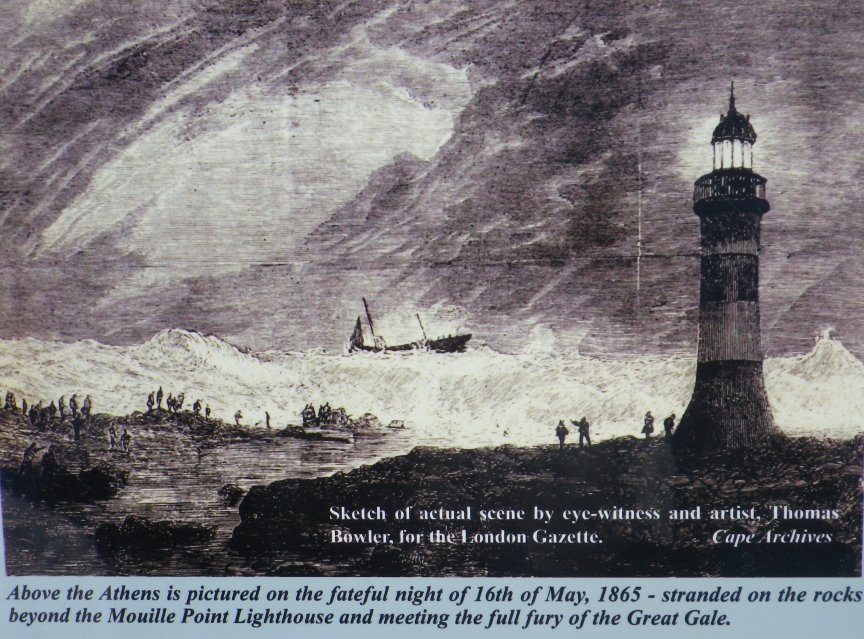
ATHENS was built in 1856 by Alexander Denney at Dumbarton with a tonnage of 739grt, a length of 224ft 7in, a beam of 30ft 1in and a service speed of 10 knots.
Built for Schilizzi & Co. of Liverpool for their Liverpool - Greece service she was acquired by the Union Steam Ship Co. in 1858 to replace the undersized Saxon on the mail run.
In 1865 she was on the Mauritius service and during the 'Great Gale' on 18th May she attempted to steam out to sea as a preference to remaining at anchor in Table Bay. She succeeded in rounding Mouille Point but huge waves doused her boilers and she was blown onto the rocks where she broke up before daylight with the loss of all 29 persons on board
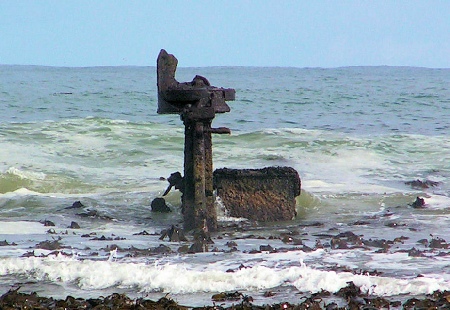
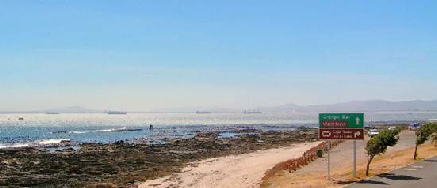
The “Athens” today
No memorial has been erected to Captain David Smith or his crew, but the engine block of the “Athens”, seen every day by passers by on Green Point’s main road reminds the few who know the story, of the heroism and fate of the “Athens” crew. This photo I took in 2010, 145 years after the tragedy.
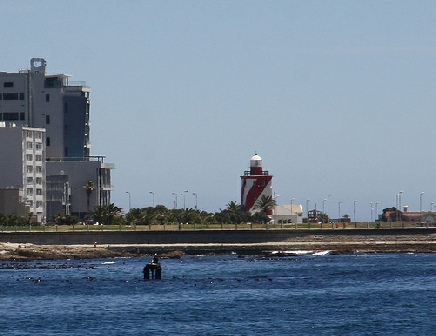
The remains of her engines still visible close in to Green Point
Lost in The Great Storm - 1865
Master |
From |
To |
|
H Hoffman |
1858 |
|
|
W Strutt |
1858 |
1860 |
|
E G Baynton |
1860 |
|
|
J Boxer |
1861 |
|
|
D Smith |
1861 |
|
|
W Ladds |
1862 |
1863 |
|
F J Waldeck |
1864 |
1865 |
|
R B Davie |
3/1865 |
1865 |
|
D Smith |
|
5/1865 |
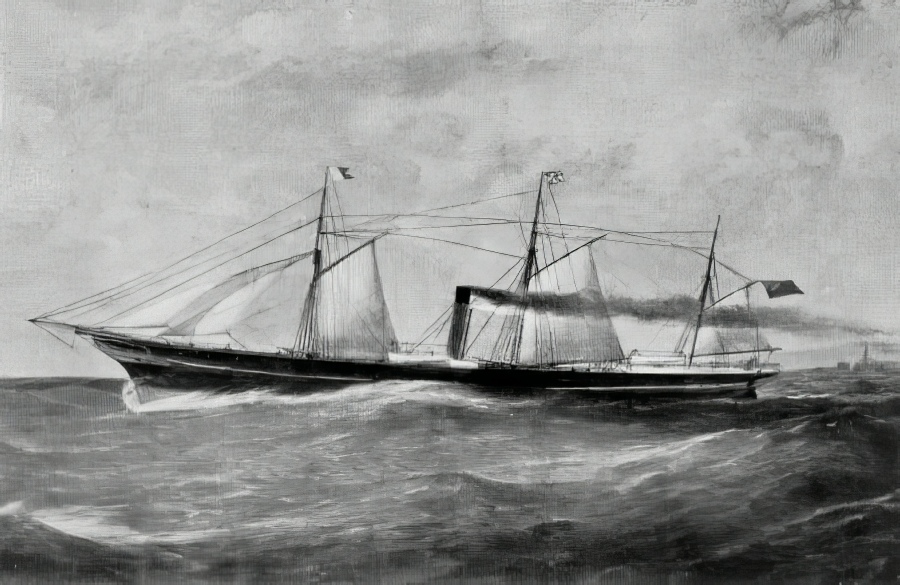
Career Summary
Vessel |
Built |
Tonnage |
Official No |
Ship Builder |
Engine Builder |
Engine Type |
HP |
Screws |
|
Athens |
1856 |
739 |
17836 |
Alexander Denny Dumbarton |
Tulloch & Denny Dumbarton |
Compound Steam |
130 HP |
1 |




